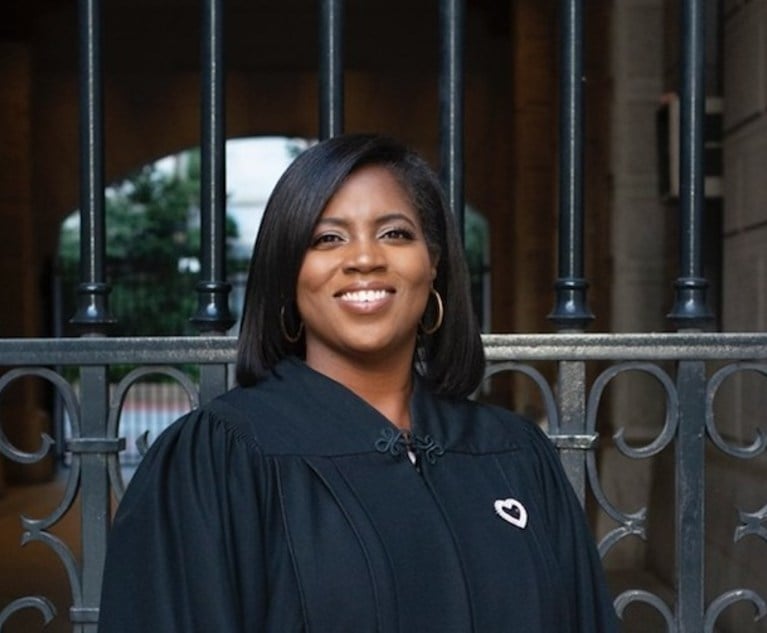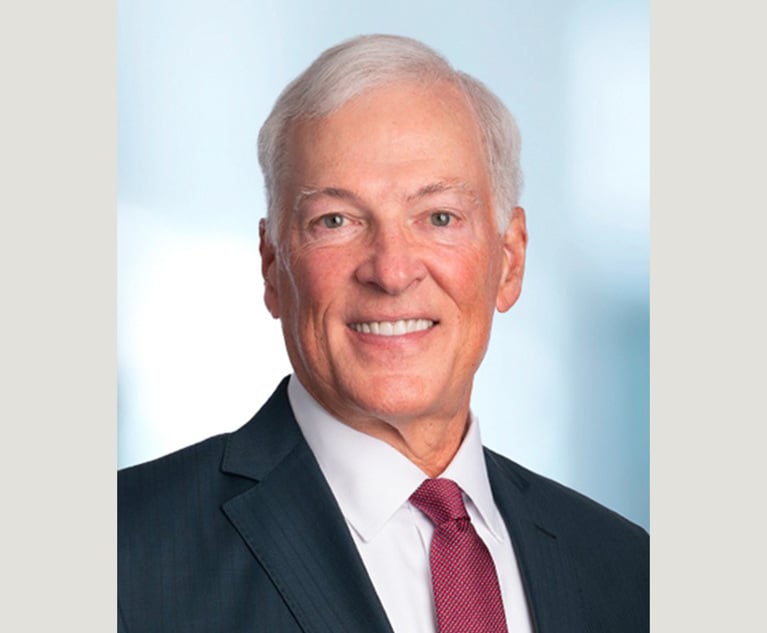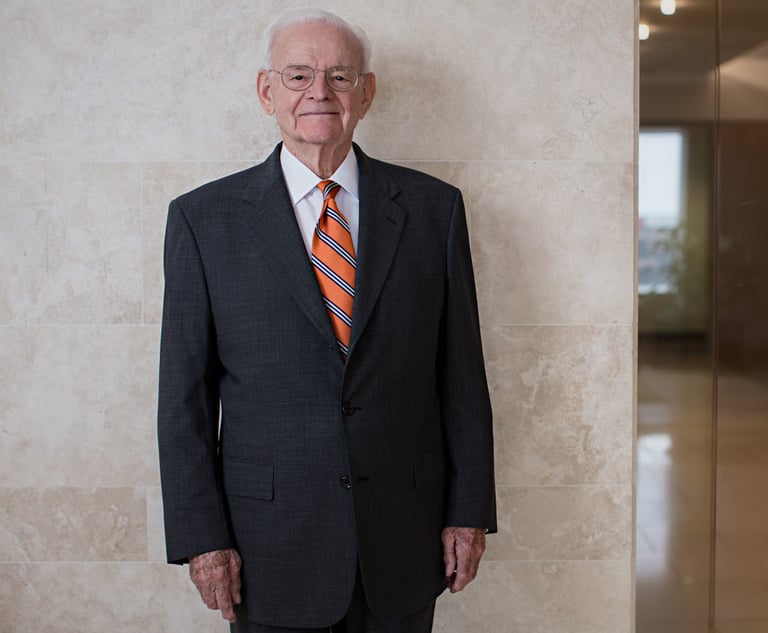 Philadelphia Court of Common Pleas Judge Timika Lane
Philadelphia Court of Common Pleas Judge Timika Lane Superior Court Hopeful, Judge Timika Lane, on Creating an 'Unbiased Environment' for Litigants
"Litigants are not just names on a pleading, they are members of our community, and they deserve judges who have the experience and the knowledge to properly apply the facts of their cases to the law of the land," Lane said.
October 21, 2021 at 04:29 PM
7 minute read
On Nov. 2, Pennsylvanians are set to decide which candidates will join the ranks of the state Superior Court. To get a better understanding of each candidate's background and judicial philosophy, The Legal has asked each to respond to a questionnaire touching on a variety of topics important to the legal community.
Responses to the questionnaires are set to be published in the weeks leading up to the general election. The second installment comes from Philadelphia Court of Common Pleas Judge Timika Lane, a Democrat. On the common pleas bench since 2013, Lane received her law degree at Rutgers University School of Law-Camden, and received a "recommended" rating by both the Pennsylvania Bar Association and the Philadelphia Bar Association.
The following has been lightly edited for style.
The Legal: How would you describe your judicial philosophy?
Lane: My top priority is to provide a fair and balanced approach to the law. I think it is imperative that every person that appears before the court be treated with dignity and respect. Litigants are not just names on a pleading, they are members of our community, and they deserve judges who have the experience and the knowledge to properly apply the facts of their cases to the law of the land.
The Legal: What two decisions or cases are you most proud of, and why? Conversely, what two opinions or cases would you like to take back or revise if you could, and why?
Lane: Every case that I preside over is especially important to each litigant who appears before me. As a result, I try to take particular care with every decision I make. So, I cannot say that I take personal pride in the outcomes of any particular case, but just on the impact I try to make on the witnesses, victims and defendants who enter my courtroom.
The Legal: In your view, what makes you the best candidate for the role?
Lane: My experience makes me the best candidate for this role. I was first elected to the Court of Common Pleas in 2013. My term began in January of 2014, but I have been assigned to the Major Trials Jury Division since June of 2014. In that capacity, I have presided over thousands of serious felony cases in Philadelphia County. Currently, I am solely responsible for the human trafficking docket in adult court. I also have a large number of domestic/family violence cases, sexual assault, rape and grand jury cases.
Additionally, I have written countless opinions and I am often cited for my well-authored opinions by the Superior Court. Prior to my time on the bench, I had a well-rounded career as an attorney. I served as a chief legal counsel in the Pennsylvania Senate, assessing the constitutionality of proposed and existing legislation, providing legal advice and guidance regarding the legal implications of legislation, regulations and administrative policies, as well as interpreting statutes and assisting in the drafting of legislation. Before my time with the Senate, I served at different times on both sides of the aisle, first in the Philadelphia District Attorney's Office and later as a public defender representing indigent men, women and children in criminal matters. My experience also extended to the practice of domestic relations, dependency and civil matters where I served as a certified child advocate and civil arbitrator.
The Legal: What is the greatest threat to the practice of law, or problem the profession faces?
Lane: I think the greatest problem facing the legal profession is keeping up with changes in technology and its effect on traditional methods of litigation. More than ever, it is incumbent upon litigants, counsel and the courts to evolve in the manner in which technology is used and do so in a secure fashion to protect the rights of everyone involved.
The Legal: What does your party membership say about you and your legal outlook?
Lane: The citizens of this commonwealth deserve judges who will uphold the law without respect to their own personal beliefs. Without question, creating an unbiased environment for all litigants will be the cornerstone of every argument before me and every opinion authored by me.
The Legal: In light of the recent constitutional amendments approved by voters, what is the courts' role in defining or limiting the emergency powers of the governor and General Assembly?
Lane: The role of a judge is to keep an open mind when litigants appear before them and to apply the specific facts of every case to the law that exists.
The Legal: Do you think courts in Pennsylvania have a perception problem when it comes to appearing partisan? If so, what would you do to combat this?
Lane: Members of the judiciary are constrained from conflating their personal bias and beliefs with their responsibility to the administration of justice. In order to maintain confidence among the members of our community, I will always strive to create a fair and balanced approach to the law.
The Legal: With budgetary threats over the court's computer system and several bills to impeach justices, or reorganize the courts having been drafted over the past few years, the relationship between the General Assembly and the Supreme Court appears to have become strained. Is that a concern, and, if elected to the high court, what would you do about that?
Lane: One of the greatest aspects of our system of government is that each branch is separate and independent from the other. That being said, I will continue to strive to ensure that the role of the judiciary is one of protecting the constitutionality of the laws of the commonwealth.
The Legal: Did Biden, Josh Shapiro, Stacy Garrity and Tim DeFoor win free, fair and above-board elections in 2020, or do you think the contests were significantly impacted by fraud?
Lane: Yes.
The Legal: What factors matter in deciding when recusal is necessary, and would you recuse yourself if a campaign contributor were involved in litigation as a party or attorney before you?
Lane: The Pennsylvania rules of judicial conduct notes that "[t]he Pennsylvania legal system is founded upon the principle that an independent, fair, impartial, and competent judiciary, composed of persons of integrity, will interpret and apply the law that governs our society."
Consequently, it is incumbent upon members of the judiciary to never engage in activities that are likely to impugn the impartiality and integrity of the bench. Additionally, on the issue of disqualification Rule 2.11 sets forth the requirements for a judicial recusal and I pledge to continue to adhere to the criteria set forth therein.
The Legal: How important is consensus—particularly unanimous consensus—in appellate court opinions and are there limits when a judge should only concur, or should they do it any time they feel like it?
Lane: I think that each judge should endeavor to reach a consensus if it can be done so without harm to the conscience and oath that they made to uphold the constitution. I also believe that each judge should be free to concur in judicial opinions as required by their own independent analysis of the specifics facts and the law applied.
The Legal: How important is stare decisis and when should a court depart from it?
Lane: Stare decisis is extremely important. Judges have a duty to uphold the law as it exists. However, there will be occasions when novel legal issues arise, or distinct factual situations occur that require judges to depart from previously held decisions. This is how our legal system has continued to thrive since its inception.
The Legal: Who are your role models and mentors?
Lane: My mother and my grandmother remain my greatest role models. My grandmother worked in the cafeteria of Rolling Hill Hospital in Montgomery County. She got up early every day and took public transportation from West Philadelphia to Elkins Park. My mother entered a male-dominated field and was able to excel and thrive, as a single parent. I never heard either woman complain about the hours they worked or the rigor of their positions. Each taught me the love my community and to hold my held high. They created a sense of responsibility and duty within me that I will never be able to repay.
NOT FOR REPRINT
© 2025 ALM Global, LLC, All Rights Reserved. Request academic re-use from www.copyright.com. All other uses, submit a request to [email protected]. For more information visit Asset & Logo Licensing.
You Might Like
View All
Saxton & Stump Lands Newly Retired Ex-Chief Judge From Middle District of Pa.
3 minute read
'Discordant Dots': Why Phila. Zantac Judge Rejected Bid for His Recusal
3 minute read
Judge Louis C. Bechtle: An American Jurist Who Relied on Common Sense, Sound Judgment and Fairness
5 minute read
Samuel M. Lehrer, Retired Philadelphia Court of Common Pleas Judge, Dies
1 minute readTrending Stories
- 1Relaxing Penalties on Discovery Noncompliance Allows Criminal Cases to Get Decided on Merit
- 2Reviewing Judge Merchan's Unconditional Discharge
- 3With New Civil Jury Selection Rule, Litigants Should Carefully Weigh Waiver Risks
- 4Young Lawyers Become Old(er) Lawyers
- 5Caught In the In Between: A Legal Roadmap for the Sandwich Generation
Who Got The Work
J. Brugh Lower of Gibbons has entered an appearance for industrial equipment supplier Devco Corporation in a pending trademark infringement lawsuit. The suit, accusing the defendant of selling knock-off Graco products, was filed Dec. 18 in New Jersey District Court by Rivkin Radler on behalf of Graco Inc. and Graco Minnesota. The case, assigned to U.S. District Judge Zahid N. Quraishi, is 3:24-cv-11294, Graco Inc. et al v. Devco Corporation.
Who Got The Work
Rebecca Maller-Stein and Kent A. Yalowitz of Arnold & Porter Kaye Scholer have entered their appearances for Hanaco Venture Capital and its executives, Lior Prosor and David Frankel, in a pending securities lawsuit. The action, filed on Dec. 24 in New York Southern District Court by Zell, Aron & Co. on behalf of Goldeneye Advisors, accuses the defendants of negligently and fraudulently managing the plaintiff's $1 million investment. The case, assigned to U.S. District Judge Vernon S. Broderick, is 1:24-cv-09918, Goldeneye Advisors, LLC v. Hanaco Venture Capital, Ltd. et al.
Who Got The Work
Attorneys from A&O Shearman has stepped in as defense counsel for Toronto-Dominion Bank and other defendants in a pending securities class action. The suit, filed Dec. 11 in New York Southern District Court by Bleichmar Fonti & Auld, accuses the defendants of concealing the bank's 'pervasive' deficiencies in regards to its compliance with the Bank Secrecy Act and the quality of its anti-money laundering controls. The case, assigned to U.S. District Judge Arun Subramanian, is 1:24-cv-09445, Gonzalez v. The Toronto-Dominion Bank et al.
Who Got The Work
Crown Castle International, a Pennsylvania company providing shared communications infrastructure, has turned to Luke D. Wolf of Gordon Rees Scully Mansukhani to fend off a pending breach-of-contract lawsuit. The court action, filed Nov. 25 in Michigan Eastern District Court by Hooper Hathaway PC on behalf of The Town Residences LLC, accuses Crown Castle of failing to transfer approximately $30,000 in utility payments from T-Mobile in breach of a roof-top lease and assignment agreement. The case, assigned to U.S. District Judge Susan K. Declercq, is 2:24-cv-13131, The Town Residences LLC v. T-Mobile US, Inc. et al.
Who Got The Work
Wilfred P. Coronato and Daniel M. Schwartz of McCarter & English have stepped in as defense counsel to Electrolux Home Products Inc. in a pending product liability lawsuit. The court action, filed Nov. 26 in New York Eastern District Court by Poulos Lopiccolo PC and Nagel Rice LLP on behalf of David Stern, alleges that the defendant's refrigerators’ drawers and shelving repeatedly break and fall apart within months after purchase. The case, assigned to U.S. District Judge Joan M. Azrack, is 2:24-cv-08204, Stern v. Electrolux Home Products, Inc.
Featured Firms
Law Offices of Gary Martin Hays & Associates, P.C.
(470) 294-1674
Law Offices of Mark E. Salomone
(857) 444-6468
Smith & Hassler
(713) 739-1250





